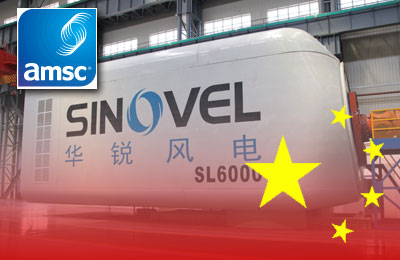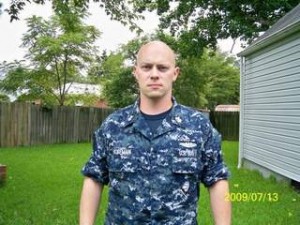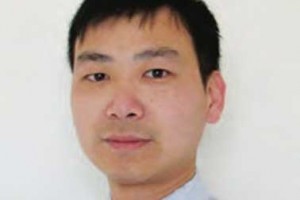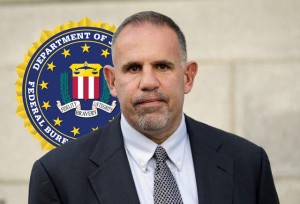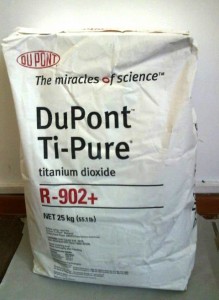500 American workers lost their jobs because a Chinese company stole $800 million dollars worth of their company’s trade secrets. How much is security worth?
It’s ironic that apparently three years ago, Obama heralded this US company’s trade relationship with China as a “model for job creation in the US and China.”
Some ‘model’!
“The allegations in this indictment describe a well-planned attack on an American business by international defendants–nothing short of attempted corporate homicide.” –U.S. Attorney John W. Vaudreuil.
DOJ charges Sinovel and two of its employees with industrial espionage; AMSC wants review of U.S./China trade relationship (Boston Business Journal)
After a two-year investigation by the FBI, the Department of Justice has charged China-based Sinovel and two of its employees for stealing trade secrets from Devens, Mass. -based American Superconductor Corp. (AMSC), the DOJ announced Thursday.
Sinovel and its two employees were charged with stealing AMSC’s software code and IP property in four Sinovel turbines installed in three Massachusetts towns after AMSC worked with law enforcement officials to verify that the Sinovel-manufactured turbines installed in Charlestown, Fairhaven and Scituate included AMSC’s stolen IP , according to CEO Daniel McGhan. . .
. . . . As a result of the charges, AMSC is asking the Obama administration and Congress to take a closer look at the U.S. trade relationship with China.
“The fact that Sinovel has exported stolen American intellectual property from China back into the United States – less than 40 miles from our global headquarters – shows not only a blatant disrespect for intellectual property but a disregard for international trade law,” McGhan said in a statement Thursday.
“These criminal acts have led to significant financial harm to AMSC, its employees and their families as well as its shareholders.”
“Three years ago, President Obama heralded the AMSC trade relationship with China as a model for job creation in the U.S. and China. Today, we believe it’s clear that a crime has been committed,” McGahn said.
“We ask that AMSC be a model for how intellectual property theft be handled in a fair and just manner.”
According to McGhan, more than 500 AMSC employees were cut from the company as a result of Sinovel’s actions, which were discovered in June 2011 when AMSC found Sinovel had gained access to and was using stolen AMSC trade secrets and IP provided illegally by AMSC employee Dejan Karabasevic.
According to communication obtained by AMSC and law enforcement officials, the Sinovel’s CEO and Director Han Junliang promised to pay Karabsevic more than $1.5 million in exchange for the information. The communication also contained the transfer of IP. The employee later confessed to the crime and to his connection with Sinovel. . . .(read the rest)
A manufacturer and exporter of wind turbines based in the People’s Republic of China, two employees of that manufacturer and a former employee of a subsidiary of AMSC, a United States-based company formerly known as American Superconductor Inc., were charged today with stealing trade secrets from AMSC causing an alleged loss of more than $800 million to the company, announced Acting Assistant Attorney General Mythili Raman of the Justice Department’s Criminal Division and U.S. Attorney for the Western District of Wisconsin John W. Vaudreuil.
A federal grand jury in the Western District of Wisconsin returned an indictment charging Sinovel Wind Group Co. Ltd., dba Sinovel Wind Group (USA) Co. Ltd.; Su Liying, 36, the deputy director of Sinovel’s Research and Development Department; Zhao Haichun, 33, a technology manager for Sinovel; and Dejan Karabasevic, 40, a former employee of AMSC Windtec GmbH, a wholly-owned subsidiary of AMSC, with one count each of conspiracy to commit trade secret theft, theft of trade secrets and wire fraud.
“Today, we announce charges against Sinovel and three individuals for stealing proprietary wind turbine technology from AMSC in order to produce their own turbines powered by stolen intellectual property,” said Acting Assistant Attorney General Raman.
“This charged IP theft caused significant harm to a domestic company that develops cutting edge technology and employs Americans throughout the country. Stamping out intellectual property theft is a top priority for this administration, and we will continue to work with our IP Task Force partners to ensure that American ingenuity is protected.”
“The allegations in this indictment describe a well-planned attack on an American business by international defendants–nothing short of attempted corporate homicide,” said U.S. Attorney Vaudreuil.
“The Department of Justice and this office are committed to protecting American commerce and aggressively prosecuting those who seek to steal and use our intellectual property. I commend the efforts of the FBI and their Austrian counterparts in this long-term international investigation, and the assistance provided by the owners and operators of the Massachusetts turbines.”
“The Sinovel case is a classic example of the growing insider threat facing our nation’s corporations and their intellectual property,” said FBI Executive Assistant Director Richard McFeely.
“The FBI will not stand by and watch the hemorrhage of U.S. intellectual property to foreign countries who seek to gain an unfair advantage for their military and their industries. We are actively working with our private sector and government partners to disrupt and impact those who have made it their mission to steal U.S. military and corporate secrets. Since 2008, our economic espionage arrests have doubled; indictments have increased five-fold; and convictions have risen eight-fold.”
Karabasevic headed the automation engineering department at AMSC Windtec in Klagenfurt, Austria. Su and Zhao are Chinese nationals living in China, and Karabasevic is a Serbian national who lived in Austria, but now lives in Serbia.
According to the indictment, AMSC developed and sold software and equipment to regulate the flow of electricity from wind turbines to electrical grids, and it considered the software and equipment to be trade secrets and proprietary information.
The software that runs the PM3000, a part of AMSC’s wind turbine electrical control system, was developed in Wisconsin and was stored on a computer in AMSC’s office in Middleton, Wis.
The PM3000 worked with other products, including AMSC’s Low Voltage Ride Through (LVRT) software. The LVRT system is designed to keep a wind turbine operational when there is a temporary sag or dip in flow of electricity in the electrical grid.
Sinovel purchased software and equipment from AMSC for the wind turbines that Sinovel manufactured, sold and serviced.
According to the indictment, in March 2011, Sinovel owed AMSC more than $100 million for products and services previously delivered and had entered into contracts to purchase more than $700 million in products and services from AMSC in the future.
The indictment alleges that the four defendants conspired to obtain AMSC’s copyrighted information and trade secrets in order to produce wind turbines and to retrofit existing wind turbines with LVRT technology, without having to pay AMSC for previously-delivered products and services, thereby cheating AMSC out of more than $800 million.
The indictment alleges that Sinovel, through Su and Zhao, recruited Karabasevic to leave AMSC Windtec and join Sinovel, and to secretly copy intellectual property from the AMSC computer system.
The four defendants are charged with stealing the PM3000 source code from AMSC on March 7, 2011, and transmitting it by downloading it from an AMSC computer in Wisconsin to a computer in Klagenfurt.
The indictment alleges that following the theft of AMSC’s intellectual property, Sinovel commissioned several wind turbines in Massachusetts and copied into the turbines software compiled from the software stolen from AMSC. The U.S.-based builders and operators of these Massachusetts turbines have cooperated in this investigation.
If convicted, Sinovel faces a maximum penalty on each count of five years of probation and a fine of twice the gross gain or loss, meaning Sinovel would face a fine for each count charged of up to twice the alleged loss of more than $800 million.
If convicted, Su, Zhao and Karabasevic each face a maximum penalty of five years in prison on the conspiracy charge, 10 years in prison for theft of a trade secret and 20 years in prison for wire fraud.
The charges contained in the indictment are merely accusations, and the defendants are presumed innocent unless and until proven guilty.
The case is being investigated by the Madison, Milwaukee and Boston offices of the FBI; the FBI Legal Attachés’ Offices in Vienna, Austria and Beijing; the FBI Criminal Investigative Division; the FBI Intellectual Property Rights Unit; the Bundeskriminalamt (Federal Criminal Intelligence Service) and the Bundesministerium Fuer Justiz (Federal Ministry of Justice) in Austria; the Landeskriminalamt – Klagenfurt and the Staatsanwaltschaft – Klagenfurt (Criminal Investigative Police and State Prosecutor’s Office – Klagenfurt, Austria); and with the assistance of the Justice Department’s Office of International Affairs. The case is being prosecuted by Assistant U.S. Attorneys Timothy M. O’Shea and Munish Sharda, and Trial Attorney Brian Levine of the Criminal Division’s Computer Crime and Intellectual Property Section.
This case is part of efforts being undertaken by the Department of Justice Task Force on Intellectual Property (IP Task Force). Attorney General Eric Holder created the IP Task Force, which is led by the Deputy Attorney General, to combat the growing number of domestic and international intellectual property crimes, protect the health and safety of American consumers, and safeguard the nation’s economic security against those who seek to profit illegally from American creativity, innovation and hard work. To learn more about the IP Task Force, go to: www.justice.gov/dag/iptaskforce.
China’s Sinovel Indicted in the United States for Stealing AMSC Trade Secrets (AMSC press release)
AMSC today requested that the Obama administration and Congress re-evaluate the U.S. trade relationship with China in conjunction with the Department of Justice (DoJ) indictment of Sinovel and two of its employees for the theft of AMSC’s trade secrets.
Following an investigation by the Federal Bureau of Investigation (FBI), the DoJ today charged Sinovel and two of its employees with the theft of Massachusetts-based AMSC’s proprietary software code and the use of that intellectual property in four 1.5 MW Sinovel turbines that have been installed in the Massachusetts towns of Charlestown, Fairhaven, and Scituate. Those parties and their contractors are not implicated in any way. The DoJ’s press release can be found on its website.
“We have worked with law enforcement to verify that these Sinovel-manufactured wind turbines contain AMSC’s stolen intellectual property,” said Daniel P. McGahn, AMSC’s President and CEO.
“”The fact that Sinovel has exported stolen American intellectual property from China back into the United States — less than 40 miles from our global headquarters — shows not only a blatant disrespect for intellectual property but a disregard for international trade law.”
“These criminal acts have led to significant financial harm to AMSC, its employees and their families as well as its shareholders. Over the past two years, more than 500 staff members worldwide have lost their jobs following Sinovel’s egregious and unlawful behavior.”
In September 2011, AMSC filed four legal actions against Sinovel in China alleging the illegal use of AMSC’s intellectual property and seeking more than $1 billion in deliveries and damages.
At that time, AMSC also requested that Chinese police bring criminal action against Sinovel and some of Sinovel’s employees. Nearly two years later, we believe that the Chinese police have yet to undertake an investigation and China’s civil courts have yet to begin substantive hearings of AMSC’s cases.
“Enforcement and protection of intellectual property — the DNA of new products and technologies — is essential for U.S. companies to compete successfully in a global economy. This is impossible if companies in countries such as China are brazenly stealing trade secrets through industrial and cyber espionage,” McGahn said.
“China’s president, Xi Jinping, recently said that China will protect legitimate rights of foreign enterprises. However, to date, the experience of companies like AMSC has proven otherwise.
In the E.U., our former employee confessed to collusion with Sinovel, was convicted and jailed for his crimes. In the U.S., the Department of Justice has indicted Sinovel. In China, however, the legal system has yet to take substantive action. We believe this clearly demonstrates that the rights of foreign businesses are not being protected.”
“The inability to rely on the rule of law is creating a risk for U.S. businesses operating in China. The administration has been incredibly supportive of our issue and so I’m requesting that, together with Congress, they examine how trade secret theft is impacting American jobs and innovation and address the issue before it further impacts economic development.”
“We must get tough on those foreign companies that steal American ingenuity,” said U.S. Senator Elizabeth Warren (D-Mass). “It’s time to enforce our trade laws to ensure that U.S. companies compete on a level playing field. I call on China to cooperate fully in ending these unlawful practices. Decisive actions on their part will send a positive signal to the United States that China supports fair and mutually beneficial trade relations.”
Background — a Two-Year Odyssey
AMSC and Sinovel began working together in 2005, shortly after Sinovel’s founding. AMSC provided extensive wind turbine design and engineering services as well as power electronics and controls to Sinovel in the years that followed. By 2011, with the cooperation of AMSC, Sinovel was manufacturing thousands of wind turbines annually and had emerged as China’s largest and the world’s second largest wind turbine manufacturer.
In March 2011, the Chinese company abruptly refused substantial shipments from AMSC, breaching multiple contracts. In June of 2011, AMSC discovered that Sinovel had gained access to and was actively using stolen AMSC trade secrets and intellectual property illicitly supplied by Dejan Karabasevic, an AMSC employee. Karabasevic confessed to the crime and to his collusion with Sinovel, and he was subsequently imprisoned in Austria.
In addition to this confession, the evidence collected by law enforcement and AMSC includes hundreds of e-mails and messages between Karabasevic and senior-level Sinovel staff members. These messages give a detailed account and timetable of the crime. They demonstrate that Sinovel sought this stolen intellectual property, the conspirators knew that this intellectual property was obtained illegally, and also were aware of the damages that the theft would likely inflict on AMSC.
The evidence includes contracts, personally authorized by Sinovel’s then chairman and CEO and current director, Han Junliang, promising to pay Karabasevic in excess of $1.5 million (approx. 11 million RMB).
In addition, law enforcement has obtained the e-mails containing the actual intellectual property transfer as well as evidence from multiple wind farms in both China and the United States demonstrating that Sinovel has been utilizing the stolen software to upgrade its wind turbines.
“Our case against Sinovel is incredibly clear-cut and the evidence is very damning,” said John Powell, Vice President and General Counsel, AMSC. “We would like to again advise wind farm developers around the world that any wind turbines that are purchased from Sinovel may very well contain stolen intellectual property from AMSC. We will continue to seek justice on a global basis.”
Government Support
AMSC has received strong support from officials within various branches of the U.S. and E.U. governments. The list of supporters includes former Secretary of State Hillary Clinton, current Secretary of State John Kerry and Vice President Joe Biden from the United States, U.S. Ambassador to Austria, William Eacho, former U.S. Trade Representative Ambassador Ron Kirk, Deputy Secretary of Commerce Rebecca Blank, Former Secretary of Commerce and current Ambassador to China, Gary Locke, U.S. Intellectual Property Enforcement Coordinator Victoria Espinel, Senator Elizabeth Warren, Congresswoman Niki Tsongas, as well as Karel De Gucht, E.U. Commissioner for Trade, Daniel Caspary, Majority Speaker in the European Parliament on Trade and Othmar Karas, Vice-President of the European Parliament.
“It is clear that intellectual property remains at the forefront of U.S. and E.U. trade agendas,” McGahn said. “We deeply appreciate the support we have received thus far from all levels of the U.S. and E.U. governments but, despite all of the evidence in our favor, the fact remains that we still do not have a resolution. Successful trade relationships depend on businesses knowing that they can depend on the rule of law.”
McGahn concluded: “Three years ago, President Obama heralded the AMSC trade relationship with China as a model for job creation in the U.S. and China. Today, we believe it’s clear that a crime has been committed.”
“We ask that AMSC be a model for how intellectual property theft be handled in a fair and just manner. We will continue to defend our intellectual property and, with the assistance of the U.S. and E.U. governments, we remain confident that justice will prevail.”




